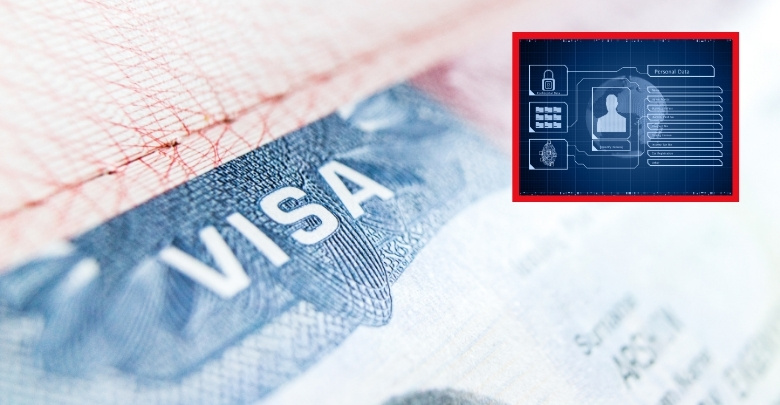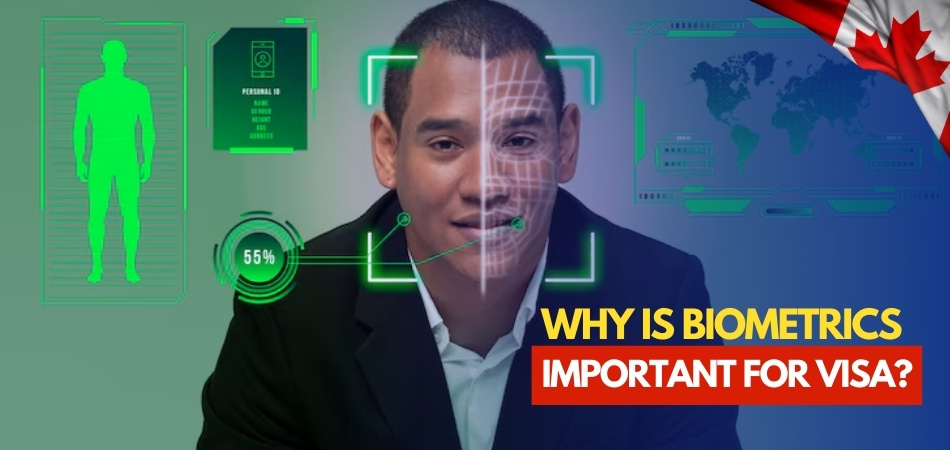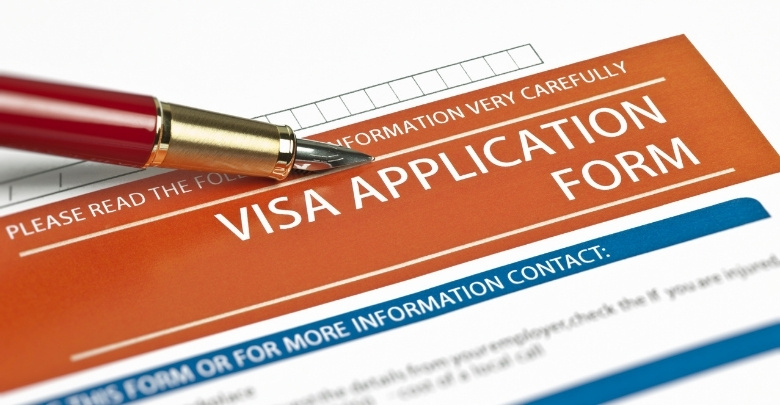Nowadays, biometric technology has revolutionized the way we handle identity verification, especially in the context of visa processing. This begs the question: Why is biometrics important for visas?
Biometric is important for visa processing as it establishes accurate identity, improves verification accuracy, and reduces identity fraud. With the help of these features, authorities can verify that the person applying for the visa is who they claim to be. In this way, the process is made faster and more secure.
This added layer of verification not only boosts visa processing efficiency but also improves the overall immigration system. Continue reading to explore how biometrics is transforming visa procedures and what it means for future travel.
Biometrics in Visa Processing- How Does it Work?
Biometrics in visa processing is a modern technology that increases security and efficiency. It uses unique physical traits like fingerprints and facial features. These traits are nearly impossible to fake, making identification accurate and reliable. This process begins when you first apply for a visa.

In a technology-driven country like Canada, taking this step is essential to ensure secure entry. As part of the Canada visa process after biometrics, you must provide your biometric data at an authorized center. This data includes your fingerprints and a digital photo, which are then securely stored in a centralized database to facilitate the visa procedure.
At the border, officials scan your fingerprints or face to confirm your identity. This quick comparison ensures you are who you claim to be. It prevents someone else from using your identity fraudulently. This method not only boosts security but also speeds up the entire travel process, making it safer and more convenient for everyone involved.
Why is Biometrics Important for Visas?
Biometrics is crucial for visa processing because it establishes accurate identity, enhances verification accuracy, and reduces identity fraud. This technology uses unique physical traits, like fingerprints and facial features, ensuring secure and efficient visa processes. Here are a few reasons why biometrics are so important for visa applications.

Ensuring Accurate Identity Verification
Biometrics provides a reliable way to verify the identity of visa applicants. Each person’s biometric data is unique and unchangeable. This makes it nearly impossible for anyone to fake or duplicate another person’s identity. With accurate identity verification, authorities can confidently issue visas to legitimate travelers.
Traditional identification methods, like passports and ID cards, are not always foolproof. These documents can be lost, stolen, or forged. Biometric data, however, cannot be easily altered or misused. This adds a significant layer of security to the visa application process.
Reducing Identity Fraud
Identity fraud is a major concern in visa processing. Criminals often attempt to use stolen or false identities to obtain visas. Biometrics makes it much harder for these fraudulent activities to succeed. Fingerprints and facial recognition data are difficult to fake.
By using biometric data, visa authorities can quickly detect and prevent identity fraud. This ensures that only legitimate applicants receive visas. Reducing fraud protects countries from potential threats. It also maintains the integrity of the immigration system.
Streamlining the Application Process
The biometric system streamlines the visa application process significantly. Applicants provide their biometric data once, and it gets stored securely. This data can be easily accessed for future verifications. This reduces the need for repeated identity checks.
Streamlining the process saves time for both applicants and authorities. It makes the entire procedure more efficient and less stressful. Fast and accurate processing is beneficial for everyone involved. This also improves overall customer satisfaction with the visa application system.
Improving Border Security
Biometrics plays a crucial role in enhancing border security. At ports of entry, officials can quickly verify travelers’ identities using their biometric data. This ensures that only the person to whom the visa was issued can enter the country. It adds an additional security checkpoint.
Enhanced border security helps prevent illegal entry and protects national security. Authorities can identify and stop individuals who pose a threat. This system also helps track travelers and ensures they adhere to visa regulations. It creates a safer environment for citizens and visitors alike.
Supporting International Travel and Immigration Policies
Biometrics supports the enforcement of international travel and immigration policies. Accurate identity verification helps ensure compliance with visa conditions. This includes monitoring the duration of stay and tracking entry and exit records. It supports law enforcement efforts.
International cooperation is also enhanced through shared biometric databases. Countries can work together to identify and apprehend criminals. This collaboration improves global security. Biometrics thus plays a vital role in maintaining orderly and lawful international travel.
Future-Proofing the Visa System
Biometric technology is continually evolving, making it a future-proof solution for visa processing. Innovations in this field lead to even more accurate and efficient systems. Adopting biometrics ensures that the visa process remains up-to-date with technological advancements. This future-proofs the system against emerging threats.
Future-proofing the visa system also involves integrating new technologies seamlessly. As biometrics become more advanced, they will offer even greater security. This adaptability makes biometrics an essential tool for modern immigration systems. It ensures that visa processing remains reliable and secure for years to come.
Can a Visa Be Issued Without Biometrics?
Visa issuance without biometrics depends largely on the specific visa category and the country’s regulations. In that case, understanding biometrics in visa process helps clarify why certain visas, like short-term tourism or business visas, may not always require it. However, most long-term visas, like work or residence permits, usually need biometric data.
Some countries have special provisions for renewing visas without new biometrics if previous data is still valid. This is common for frequent travelers who need multiple entries over a short period. Always check the embassy’s website or contact them directly for the most accurate information.
In emergencies, such as humanitarian crises, exceptions might be made to expedite visa processing. Provide all required documentation and follow the application process closely. Seeking guidance from a visa consultant can also clarify specific requirements and exceptions.
Who Needs to Provide Biometrics for a Visa?
When applying for a visa, biometrics provide a way to verify identity through unique physical characteristics. This process enhances security and helps prevent identity fraud. Each country has its own rules regarding who must submit biometrics.
- First-Time Applicants: Anyone applying for a visa for the first time must provide biometrics. This helps to securely establish their identity in the database.
- Long-Term Visas: Individuals applying for residence or work visas typically need to provide biometrics. This ensures long-term tracking and verification of identity.
- Renewal Applications: Some countries require biometrics for renewing visas, ensuring that the applicant’s data is up-to-date. Exceptions might exist based on the previous biometrics’ validity.
- Students and Workers: Students and workers often provide biometrics to comply with immigration rules. This secures their stay and facilitates in-country procedures.
- Humanitarian Grounds: Applicants on humanitarian grounds might also need to provide biometrics. This standardizes processing across various visa categories.
- Frequent Travelers: Frequent travelers might be exempt from repeated biometrics if their data is still valid. This streamlines the process for regular visitors.
Providing biometrics is a critical step in visa application, enhancing security and identity verification. Always check the specific requirements for your destination country to ensure compliance and smooth travel arrangements.
Best Way to Prepare for A Biometric Appointment
Preparing for a biometric appointment is a key step in the visa application process. It involves capturing your fingerprints and photographs to verify your identity. Follow these tips to ensure your appointment goes smoothly and efficiently.
Early Appointment Scheduling
Secure your biometric appointment as soon as you receive your notice. Early booking helps prevent any last-minute rush and potential appointment unavailability. Check your schedule to pick a time that is most convenient for you. Confirm your appointment details a few days in advance to make sure everything is clear.
Document Organization
Assemble all necessary documents well before your appointment date. This usually includes your passport, visa application confirmation, and appointment letter. Double-check the list of required documents on the official website or your appointment letter. Having everything organized can save time and stress on the day of your appointment.
Proper Dress and Grooming
Dress neatly and avoid heavy makeup or extravagant hairstyles. Your biometric photo will be used for official documents, so aim for a clear, presentable appearance. Avoid wearing hats or glasses as these can obstruct facial features. Light makeup and simple hairstyles are recommended to ensure your photo accurately represents you.
Finger Preparation
Ensure your fingers are clean and free of cuts or decorations that might interfere with fingerprinting. Avoid applying lotion or hand creams before your appointment as these can cause issues with fingerprint scanning. If you have any cuts, cover them with a bandage to allow clear fingerprinting. Clean hands contribute to efficient and accurate fingerprint capture.
Timely Arrival
Arrive at least 15 minutes early to your appointment to handle any unforeseen delays. Early arrival gives you time to calm any nerves and complete any last-minute paperwork. Check for traffic updates on the day of your appointment to ensure timely arrival. Being early helps start your appointment smoothly without rushing.
After Appointment Care
Once your biometrics are taken, review any received documents for accuracy. Ask questions if anything is unclear about the next steps in your visa application process. Collect all your documents before leaving the facility. Stay informed about how to track your visa application status post-appointment.
What is the Waiting Period for Medical Care After Biometrics in Canada?
The waiting period for medical care after biometrics in Canada can vary based on individual cases and processing times. Typically, applicants may wait several weeks as their documents are reviewed. Each step depends on background checks and the overall processing time set by Canadian immigration.
For many, the time to get medical after biometrics Canada varies, often based on specific health or travel needs. After biometrics are completed, applicants will be notified by immigration regarding medical examination requirements. Following instructions promptly helps to avoid additional delays in the overall application.
Applicants should check the status of their application regularly through the official immigration portal. Staying updated on timelines ensures applicants are prepared for their medical exams. Reaching out to Canadian immigration support can also provide useful updates on medical appointment scheduling.
FAQs About Why is Biometrics Important for Visa?
Biometrics has revolutionized the visa application process by improving security and accuracy. By using unique physical traits, biometrics provides a reliable way to verify identity and prevent fraud. Here are some frequently asked questions to help you understand why biometrics is crucial for visa processing.
Can Biometrics Speed Up the Visa Application Process?
Yes, biometrics can speed up the visa application process by enabling quicker and more accurate identity verification. This reduces the need for additional documentation or background checks, which helps streamline the overall processing time for visa applications.
How Are Biometrics Stored and Protected?
Biometrics are stored in secure, encrypted databases that are protected by advanced cybersecurity measures. This ensures that sensitive biometric information is safeguarded against unauthorized access and potential misuse.
Can Biometric Data Be Reused for Future Applications?
Yes, biometric data can often be reused for future visa applications or renewals. This allows for easier verification of frequent travelers or those renewing their visas without needing to resubmit biometric information each time.
What Happens if There Are Errors in Biometric Data?
If there are errors in biometric data, such as incorrect fingerprints or images, applicants may need to visit an authorized center again for re-capture. Ensuring accurate biometric data is crucial to avoid delays or issues with the visa application process.
Do Biometric Systems Require Special Equipment?
Yes, biometric systems require specialized equipment to function effectively. This includes fingerprint scanners, facial recognition cameras, and iris scanners. These devices are designed to capture and process individual biometric data accurately. They play a crucial role in secure identity verification, ensuring that the data collected is both reliable and difficult to forge.
Final Thoughts
Through our discussion of the role biometrics play in the visa application process, we have observed how this technology makes the process of verifying identity more efficient and secure. By using unique physical traits such as fingerprints and facial features, biometrics provide a solid foundation for secure international travel. It ensures a smooth and reliable process, benefiting both applicants and authorities.
If you want to know “Why is biometrics important for visa?” just look at the technology’s ability to stop identity fraud. As biometrics become increasingly integrated into visa systems worldwide, they enhance the accuracy of border checks. This crucial layer of security is essential to maintaining countries’ immigration and border control policies.
Moreover, biometric technology facilitates stringent and effective international immigration and travel policies. It facilitates the efficient management of travelers’ flow and enforces laws governing entry and stay. By future-proofing the visa system against emerging threats, biometrics make travel and living easier.






